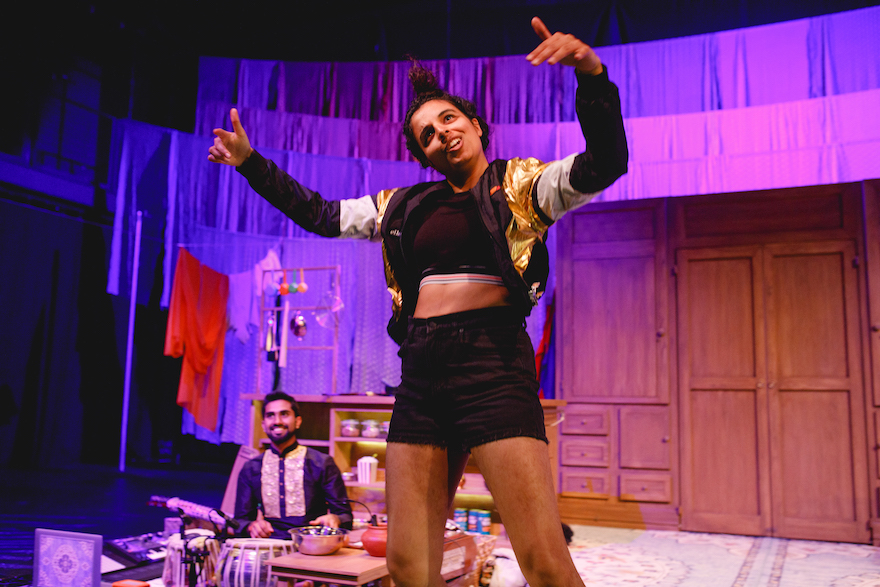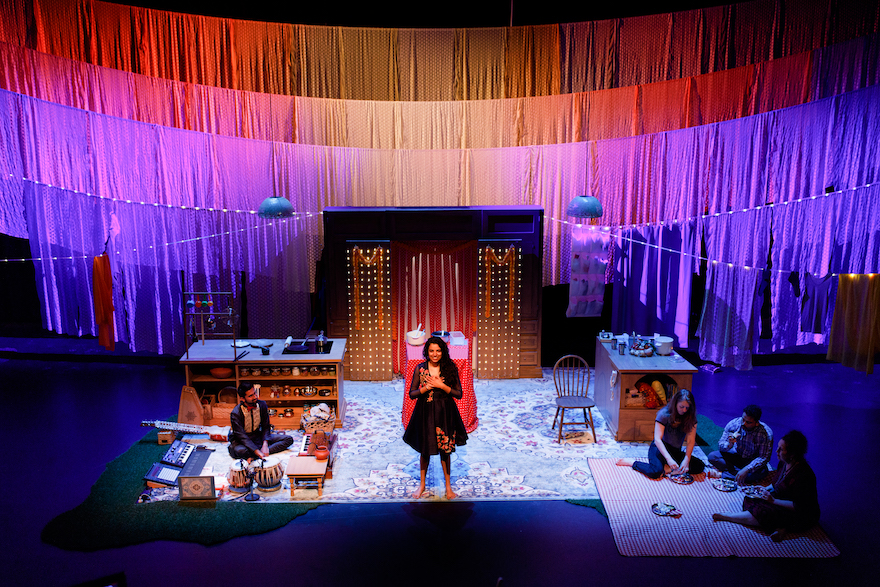Review: Black Swan State Theatre Co. & Barking Gecko Theatre, ‘Fully Sikh’ ·
Studio Underground, 12 October ·
Review by Xan Ashbury ·
It’s finger-clicking good
16 October 2019
- Reading time • 5 minutesTheatre
More like this
- Just what the doctor ordered
- Lifting the weight of the world
- Gentle touch guides lunar landing
I can’t recall ever having used the word “sick” as an expression of enthusiasm or admiration, let alone having coupled it with its obligatory intensifier, “fully”. That’s all about to change.
Like everything about this show, written and performed by Sukhjit Kaur Khalsa and directed by Matt Edgerton, its title is perfect. Not only does it hint at the show’s cultural themes, it provides a succinct and accurate review. Fully Sikh is fully sick.
One of my all-time favourite poems is “Capital Letters”, by the spoken word artist Omar Musa. It relates his experience growing up in Queanbeyan, NSW, among the “kids of immigrants” who were “made to feel very small”. Musa recalls “the whistle of go-back-to-where-you-came-froms” and how it was rappers who taught him the power of his voice. His clarion call to others who are marginalised is to “weave your stories into nets, trawl for the things you thought you’d lost”. Above all, he commands them to reject labels, be bold and live their dreams.
Fully Sikh is Sukhjit Kaur Khalsa’s story of growing up in suburban Perth – and in many ways her story parallels that journey described by Musa. Khalsa’s father came from Punjab, she tells us, and “the city of five rivers lingers in his limbs”. From the school yard, to the local swimming centre, from the supermarket to the cinema, she encountered ignorance and xenophobia. (“All that echoes is ‘towel head’ and the salty taste of embarrassment.”) She found her voice writing hip hop parodies and performing for family, before hitting the performance poetry scene six years ago – and making her mark across the country.

Khalsa has indeed woven her stories into a net of sorts. Fully Sikh trawls the depths of her family, culture and identity. And it captured the audience’s heart – from the moment we slipped off our shoes and stepped into the auditorium, to the unique curtain-call, in which she performs a shabad, a divine poetic song.
Khalsa says she was the shyest child at Leeming Primary School and in the Sikh community. You wouldn’t know it now. She manages to not just own the stage but populate it too, creating an illusion of her family members, school friends and frenemies.
Her stories, told through verse, are enhanced by show’s composer, Pavan Kumar Hari, who performs the music live on stage as well as assuming several character roles to hilarious effect.
Isla Shaw’s ingenious set has all the magic of the wardrobe from Narnia. Central to this is what appears to be functioning kitchen, representing the heart of the family home in Leeming. At times throughout the show, various pantry cupboards are opened to reveal a garden or the Gurdwara. Clever manipulations also set the scene in Woolies, Hoytes, the recreation centre, Sukhjit’s bedroom and a school assembly hall.
The action takes place under four rows of draped fabric, stretching the width of the performance space. It’s an evocative spectacle.

Fully Sikh highlights the struggle for acceptance that newcomers face, where there is ignorance and prejudice. It reminds us that the past was not necessarily a better place and that Australia is strengthened by cultural diversity. It does this not through angsty rants but through a brilliant balance of humour, honesty and a generous spirit.
At one memorable point, the audience is invited to stand and learn a Bhangra dance. (“Screw the lightbulb, tap your feet, bounce the ball.”) It’s rare to be among an audience having so much fun. Later, in silent rapture, we watch as Khalsa ties a turban onto the head of a volunteer from the audience. Along the way, we learn how the fabric reminds the wearer of their roles in their family and community, and of the values of courage, strength, unity.
Those who frequent poetry slams will be familiar with the convention of finger clicking. Rather than saving their applause until the end of a poet’s piece, audience members are free to click their fingers when they’re particularly “feeling it”. At the beginning of the show, Khalsa invited the audience to express themselves this way. The clicking soon wore off, though – not because the audience wasn’t feeling it, but simply because it’s not physically possible to click your fingers for 75 minutes straight.
Fully Sikh runs until October 27.
Like what you're reading? Support Seesaw.






